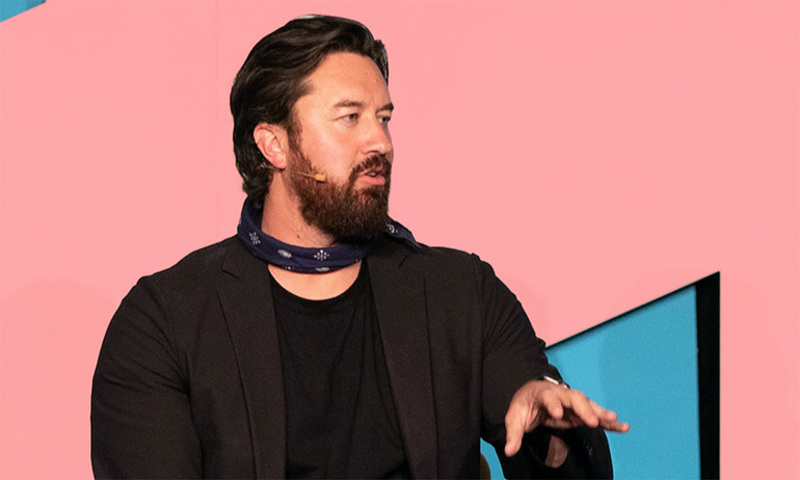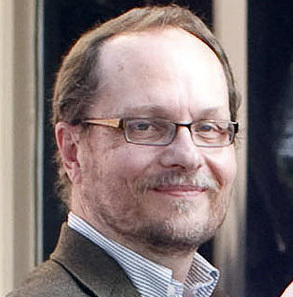The tech world is infamous in the news for its long hours, stories of insensitive culture and impatient, manically-driven bosses. But then there’s Greg Lutze.
Lutze is perhaps best-known as CEO and co-founder of VSCO, a photo and video editing app that combines premium-quality editing filters and tools, thoughtful curation, and a diverse community for creative professionals. Lutze has managed to build a company culture that values kindness and balance, and a product that is less about ads and trends and harvesting data and more about creativity and originality. Those values are not a coincidence — they flow from the top.
“Sometimes standing tall is about being humble,” Lutze says. “It’s about listening. It’s about doing the quiet things that go unnoticed. It’s about admitting you’re wrong.”
Lutze was the keynote speaker at the 2023 Biola Startup Competition, where he talked about the values that guide him. Here are four truths from Lutze in his own words:
Find your superpower
“I believe that God gives everybody a superpower. Mine is making stuff with other people. But for the longest time I would constantly doubt that — oh you never can make money as an artist or you've gotta learn business and legal and all that. And I realized it was like God had given me Spider-Man powers but I was chasing after being Thor — like, why can't I shoot lightning and look really awesome with my shirt off, all that.
“But God gave me something really amazing — maybe not the ability to shoot webs! — but the ability to make stuff and create things. I had to come to the realization that my particular skill set maybe looks crazy or isn’t of value to the outside world, but that's what I was blessed with.”
2. Clarify your purpose
“I actually took a month's sabbatical after ten years at VSCO and thought about what am I doing here?
“I realized my problem: I was equating my purpose in life with my job. And my job — technically — is to make VSCO a well-run billion-dollar company, all those things that you read in business journals and books. That might be my job, but that's actually not my purpose and can’t drive how I show up each day. But I had conflated the two.
“Actually my purpose is just to love people as God has loved me. I don't know if I can make VSCO a billion-dollar company. That's a lot of pressure, and so many other circumstances would have to go right for that kind of ‘success.’ But what can I do? I can show up and be positive and encouraging at that meeting. I can find that junior designer and tell them oh, that's awesome. I love how you executed that and your thought process behind that. Or I can find that amazing artist who doesn't call herself an artist, who says I'm not really a creative person, but yet she's amazing, and I can tell her you have a gift. You should be doing this. You should go after it.
“So that’s really my focus now, how I show up in the day to day. It’s understanding and being guided by my purpose, just being love. As Mr. Rogers said, everything is about love or the lack thereof. That's where I've come to now and it takes a lot of pressure off of me to show up like I’m perfect and I know everything and I can hit that billion dollar mark.”
3. Expect challenges with public perceptions
“Around 2019 or so, there was a social media trend called the VSCO Girl. By and large, it was a young woman, usually American, usually white, from an upper middle class status, someone who had the ability to buy certain types of brands, who cared about the environment, etc. So there were some positive things in there, but the odd thing was, it wasn't actually really associated with VSCO, and it wasn't something that we had started or had any hand in.
“That was probably the most complicated challenge we've ever had — all of a sudden we were in a mainstream spotlight, portraying us as a social network around a certain type of person, which is in some ways very exclusionary to the many people that were actually using our product.
“It was the number one search term on Google and the number two Halloween costume for a while. People were telling us this is great, right? There's so much growth that you're experiencing! But it was not what we were about.
“Because we had already made decisions about our platform, that we were a creative community, not a social network. We had already made decisions to not have ads — we didn't want to create a place for brands to advertise to our creators. We really wanted to build a great product for creators. So all these eyeballs coming in because of that meme weren't really helping us unless they became subscribers, and that wasn't really happening.
“But yet we wanted to show up for those women too, the actual women who were creators on VSCO. There was a bit of truth to the meme — there was a small subset of the people actually using VSCO who had some resemblance to that stereotype. And they were still valuable, creative people, so we had to make sure that, in our response, we were not discounting them. Because — and this is personal for me — there's already so many voices telling young women they're not good enough and their goals and interests are foolish and trivial. We were not going to go there.
“So our marketing then focused around, yes, let's talk about the girls on VSCO, not VSCO girls. Let's talk about these real-life incredible creators who are on our platform. It was important to tie it back to creativity, not popularity or trendiness, because our North Star, our vision, is about creativity. We're not trying to build the next social network. We’re trying to build a creative community that is supportive of artists.”
4. Stay grounded
“Candidly, I still struggle with how I should show up. It's a very difficult thing on a day-to-day basis. How do I stay grounded? How do I stay committed to what I know is right? I know that people want this practical three-step process or pithy business answer about how to find success, and I hope that you find that. But I would actually encourage you to focus on where your faith is at and surrounding yourself with good people who can help to keep you grounded.
“With that in place, you can still go after this big vision and big mission. But there's a reason why so many founders end up having affairs or getting into drugs or alcohol — because they're not rooted to something that's meaningful and important. So when the waves come — and they will, and things get hard or crash or your identity is rocked or your business goes under — if you are not attached to something that is meaningful, you will turn to whatever is the easiest way to cope, and that’s usually destructive.”
Sponsored by Biola’s Office of Innovation, the startup competition is an initiative that offers all current Biola undergraduate students, graduate students and recent alumni the opportunity to transform a promising idea into a successful startup business or nonprofit, aided by experienced executives and business leaders. The 2023 Startup results are here.
 Biola University
Biola University


.jpg)
.jpg)
